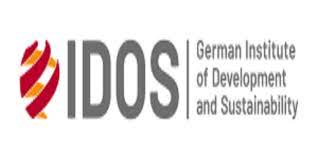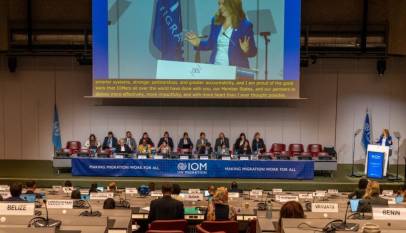COP28: IDOS calls for increased financing to mitigate climate change impacts
The German Institute of Development and Sustainability (IDOS), a leading global think-tank for sustainable development, has called for increased climate financing to help developing countries affected by climate change meet up with their financing requirements to mitigate the impacts of climate change.

This call was made during the think-tank’s virtual press briefing on Wednesday ahead of the 2023 UN Climate Change Conference (COP28) in Dubai, United Arab Emirates, which will take place from November 30 to December 12, to advance multilateral responses to the global climate crisis.
At the top of COP28’s agenda would be the first global stocktake of the implementation of the Paris Agreement, scaling-up mitigation ambition and implementation as well as operationalizing the new Loss and Damage Fund agreed at COP27.
Dr Anna-Katharina Hornidge, Director of IDOS said the world was already behind schedule in the implementation of Agenda 2030 as well as the Paris Agreement, noting that COP 28 provides an opportunity to reflect on strategies to mobilize action as well as accelerate and reshape the structures of international cooperation and transformation pathways for stabilized global climate as well as ensure transition in a socially just manner.
Thus, Dr Hornidge said it was essential for COP 28 to find strategies for funding the action plan of the third pillar of international climate change policy i.e., the Loss and Damage Fund, to enable middle and low-income countries under the aegis of Group of 77 (G-77) to address critical climate change issues through continued ownership and implementation of climate mitigation processes.
The IDOS chief decried the failure of industrialized countries of the world to fulfill their climate financing pledges, calling for an accountability framework. “It is essential that when countries make pledges, they are held accountable to fulfill such promises. They should be held accountable not only by low and middle-income countries but by the civil society and scientists.
“Another important issue we are also trying to push forward is the need to address contradictory policymaking because, aside from pledges that are not being kept, climate policies are not necessarily supported by trade policies. This contradiction undermines climate policymaking,” Dr Hornidge stated.
In her remarks, Dr Mariya Aleksandrova, a senior researcher at IDOS, said damages and losses witnessed by countries as a result of climate change include food insecurity, loss of biodiversity, displacement, loss of livelihoods and jobs as well as long-term health impacts.
Dr Aleksandrova therefore emphasized the necessity of the Loss and Damage Fund to assist countries most negatively affected by the impact of climate change even though they contribute less to climate change, noting that developing countries, including African countries, continue to face decreased levels of precipitation, drought, desertification as well as rising sea levels.
“Recent reports in the context of the global stocktake show that the resources available and accessible to countries affected by climate disasters and broader climate impacts remains highly insufficient. It also shows significant gaps in impact coverage of existing funds such as finance for tangible losses and medium-long term post-disaster recovery and reconstruction,” she narrated.
The IDOS researcher described creating new financing windows for the loss and damage fund as an essential building block for multilateral corporation as well as overcoming the shortcomings of existing mechanisms.
Dr Clara Brandi, head of programmes at IDOS, said the failure of industrialized countries to live up to their promise of mobilizing $100bn for climate financing as contained in the Paris Agreement, has created a loss of confidence and trust in them, hence the need for COP 28 to focus on confidence building around the shortfalls of COP 27 and previous COP meetings.
“It is also important that COP 28 decides how industrialized countries should compensate for the insufficient climate funds provided in the previous years. There is also the need to reform international financial order to allow more funding for climate change. Policymakers should leverage COP 28 to ensure they send strong signals for this reform agenda,” Dr Brandi insisted.













